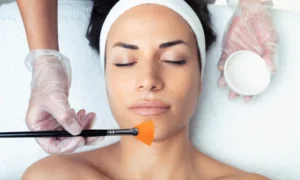Acne can be a persistent skin concern that affects people of all ages. While topical treatments and medications can help, many people seek faster, more effective solutions to treat acne and its lingering effects, such as scarring. Chemical peels have become a popular option for treating acne and improving overall skin health. Here’s an in-depth look at how chemical peels work, their types, benefits, and potential side effects.

How Chemical Peels Work for Acne
Chemical peels involve applying a solution containing exfoliating acids to the skin, which causes the top layers of dead skin cells to peel off. This process helps to:
- Unclog Pores: The exfoliation removes dirt, oil, and dead skin cells that contribute to acne breakouts.
- Reduce Acne-Causing Bacteria: Some peels contain ingredients that help eliminate the bacteria responsible for acne.
- Stimulate New Skin Growth: By removing damaged skin layers, peels encourage the growth of new, healthy skin cells, reducing acne scars and improving texture.
- Control Oil Production: Chemical peels can regulate excessive sebum (oil) production, which is often a cause of acne.
Types of Chemical Peels for Acne
There are three main types of chemical peels, each suited for different levels of acne and skin concerns:
1. Superficial or Light Peels
How They Work:
- These peels use mild acids like alpha-hydroxy acids (AHAs) and beta-hydroxy acids (BHAs) to exfoliate the outermost layer of the skin.
Best For:
- Mild acne and clogged pores
- Dull or rough skin texture
- Occasional breakouts and maintenance
Common Acids Used:
- Glycolic Acid (AHA): Known for its ability to exfoliate and brighten the skin, glycolic acid helps to reduce acne scars and improve skin tone.
- Salicylic Acid (BHA): Especially effective for treating oily, acne-prone skin, salicylic acid penetrates deep into pores to remove excess oil and dirt.
2. Medium Peels
How They Work:
- Medium peels typically contain trichloroacetic acid (TCA) or stronger AHAs. These peels penetrate deeper into the skin layers to treat more severe acne and acne scars.
Best For:
- Moderate to severe acne
- Superficial acne scars and hyperpigmentation
- Those with uneven skin tone
Common Acids Used:
- TCA: Trichloroacetic acid peels are effective at treating acne scars and more stubborn breakouts by removing damaged layers of skin.
3. Deep Peels
How They Work:
- Deep peels use stronger acids, such as phenol, to target deeper layers of the skin. These peels are more aggressive and often require longer recovery times.
Best For:
- Deep acne scars
- Severe hyperpigmentation and sun damage
- Only for those with significant skin concerns
Common Acids Used:
- Phenol: This is the most powerful type of chemical peel and is typically used for deep resurfacing. It’s only recommended for severe acne scars and may not be suitable for all skin types.
Benefits of Chemical Peels for Acne
- Clearer Skin: Chemical peels help to unclog pores and reduce acne breakouts, resulting in smoother, clearer skin.
- Reduced Acne Scarring: Peels promote collagen production, which can help diminish the appearance of acne scars over time.
- Improved Skin Texture: Regular peeling smooths rough skin and improves its overall texture and tone.
- Even Skin Tone: Chemical peels can help reduce hyperpigmentation and dark spots caused by acne, giving your skin a more even tone.
- Fast Results: Compared to some topical treatments, chemical peels can show noticeable improvements in skin texture and acne scars after just a few sessions.
- Oil Control: By removing excess oil and dead skin cells, peels help reduce oily skin, which is a common cause of acne breakouts.
Side Effects of Chemical Peels
While chemical peels are generally safe, there are some side effects to be aware of, particularly depending on the strength of the peel:
- Redness and Irritation: Peels can cause redness and sensitivity, especially immediately after treatment. This usually subsides within a few days.
- Peeling and Flaking: As the skin begins to shed its outer layers, you may experience visible peeling and flaking. This is a normal part of the process and typically lasts 3-7 days.
- Sun Sensitivity: Chemical peels make your skin more sensitive to the sun, so it’s crucial to use a high SPF sunscreen and avoid direct sun exposure after treatment.
- Hyperpigmentation: In rare cases, some people may experience dark spots or patches, especially if they have darker skin tones. To avoid this, it’s essential to consult a professional to ensure the right peel is chosen for your skin type.
- Infection or Scarring: Though rare, improper care after a chemical peel can lead to infection or scarring. It’s important to follow aftercare instructions carefully.
How to Prepare for a Chemical Peel
- Consult a Dermatologist: A professional consultation is essential to determine the best type of peel for your skin type and acne severity.
- Pre-Treatment Care: You may be advised to use certain topical treatments, such as retinoids or moisturizers, to prepare your skin. It’s also recommended to avoid any exfoliating products or direct sun exposure in the days leading up to your treatment.
- Post-Treatment Care: After a peel, follow the dermatologist’s instructions on how to care for your skin. This often includes applying gentle moisturizers, avoiding sun exposure, and using sunscreen regularly.
Conclusion
Chemical peels can be an effective treatment for acne, acne scars, and other skin imperfections when performed by a professional. By removing damaged layers of skin and stimulating new cell growth, chemical peels help achieve clearer, smoother, and more even-toned skin. However, it’s essential to choose the right type of peel based on your skin type and condition, and to follow proper pre- and post-care instructions to minimize the risk of side effects.
At La Fameux Derma Clinic, we specialize in personalized chemical peel treatments tailored to your unique skin concerns. Book a consultation with our dermatologists today to explore how chemical peels can help you achieve clearer, healthier skin!

